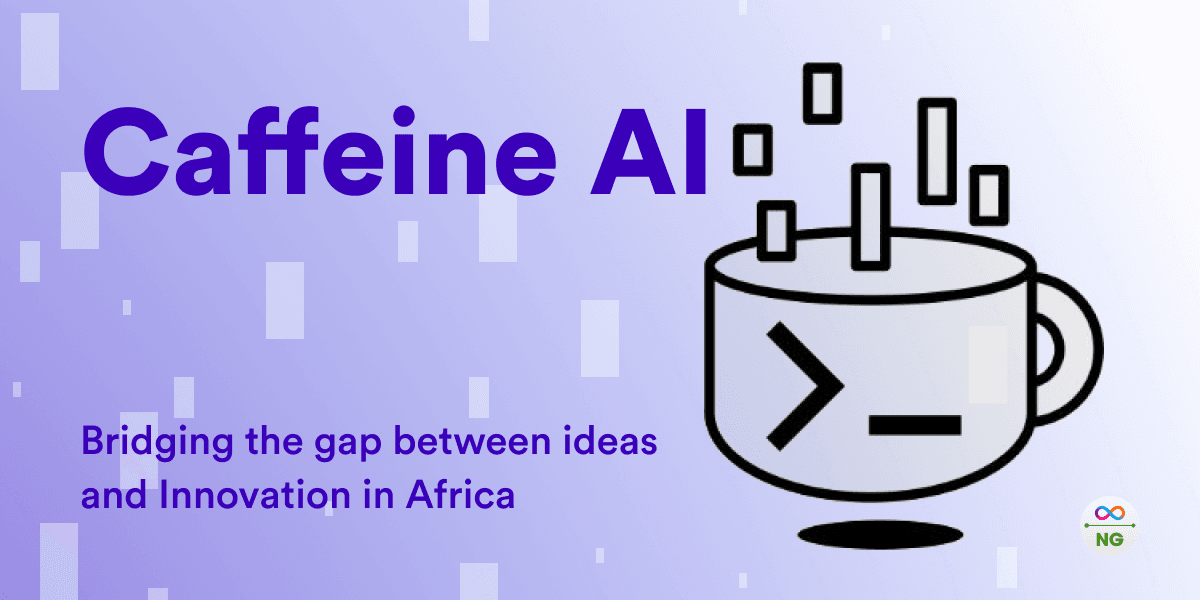
Chidi, a small agro-commerce business owner in Nigeria, had a simple idea: to connect local farmers with buyers through a digital platform. But he lacked the funds to hire a full-stack developer or subscribe to expensive cloud services.
He isn’t the only one facing such challenges. Across Africa, entrepreneurs often run into the same barriers: finding skilled tech talent, covering high hosting or cloud bills, and navigating complex infrastructure to build something reliable and scalable.
With the rise of Caffeine AI, that gap between dream and execution is beginning to close.
What is Caffeine AI?
Caffeine AI is a part of a new wave of “self-writing internet” technologies that make application building accessible through natural conversation. Powered by generative AI and running fully on the Internet Computer Protocol (ICP), Caffeine allows anyone to describe their idea in plain language and see it transformed into a functional decentralized application (dapp).
At its core, it’s designed to let entrepreneurs like Chidi say: “Build me a farmers’ marketplace with buyer registration, payments, and ratings”, and watch the system generate the scaffolding, backend logic, and even the smart contracts needed to bring it to life.
What makes this even more remarkable is the infrastructure underneath. Because apps are deployed directly on ICP, they are tamper-proof, hosted entirely on-chain, and benefit from ICP’s reverse gas model, meaning end-users don’t bear the burden of transaction fees. This makes dapps affordable and far more practical for everyday business needs in Africa.
A Developer’s Partner, Not a Replacement
One of the most exciting things about Caffeine AI is how it positions itself: not as a replacement for developers, but as a powerful assistant.
Developers can use it to accelerate work, skipping repetitive scaffolding and focusing on custom features. At the same time, non-technical entrepreneurs gain a way to launch minimum viable products (MVPs) without burning through limited funds. This balance is especially powerful for Africa, where talent gaps and cost barriers often limit innovation.
Recent improvements make this partnership even more effective. Through a collaboration with Anthropic, Caffeine taps into the Claude family of models to interpret natural language with remarkable accuracy. Combined with ICP’s decentralized backbone, it’s not just generating “demo apps”, it’s creating deployable, scalable software.
Building with Caffeine AI: From Idea to Deployment
Today, the process is smoother than when the tool was first announced. It now includes:
- App Market & Templates: Entrepreneurs can explore a marketplace of ready-made starter apps, clone them, and adapt them to their needs. Imagine Chidi finding a pre-built “digital marketplace” template and simply customizing it for local farmers in his state.
- Conversational Iteration: Features can be added or tweaked through plain dialogue. Want authentication flows, product reviews, or payment integrations? A request in natural language prompts Caffeine to generate or refine the code.
- On-chain Deployment: Apps are deployed as canisters on ICP, ensuring that data, logic, and interfaces live fully on-chain, free from reliance on third-party cloud providers. This delivers transparency, security, and resilience.
- Scalability by Default: Since ICP is designed for massive scale, an app built for a single village market can grow to serve thousands across regions without performance bottlenecks.
Even better, the reverse-gas model makes it possible for end-users like Farmers, traders, or small retailers to interact with these apps without worrying about gas fees, a huge advantage in regions where affordability matters most.
Why Africa Stands to Benefit
Africa is a continent of entrepreneurs. From Lagos to Nairobi, small businesses power economies, yet most are locked out of digital transformation due to the costs and skills required. Caffeine AI directly addresses these constraints.
- Lower barriers: No need to hire a team of developers to test an idea.
- Faster MVPs: Entrepreneurs can launch products quickly, iterate with feedback, and grow sustainably.
- Localized Potential: Future updates could bring support for African languages and region-specific templates, making digital platforms even more inclusive.
- Community Driven: With ICP’s open and decentralized nature, local communities can shape, govern, and adapt tools to their unique contexts.
WHAT'S TO COME...
While Caffeine AI is still evolving, its trajectory is promising. The alpha version has already introduced features like the App Market and cloning, and its roadmap points to full general availability in late 2025. Some limitations remain, such as customization quirks and token/NFT functionality that still need polish, but the foundation is strong and improving fast.
For Chidi and thousands like him, this means that the dream of building a scalable, secure, and affordable digital business is no longer out of reach. Caffeine AI is making it possible to bridge the gap between ideas and innovation, giving African entrepreneurs the tools to create on their own terms.
The internet is learning to write itself, and Africa is ready to turn that into an opportunity.
Author: Mana Lamja